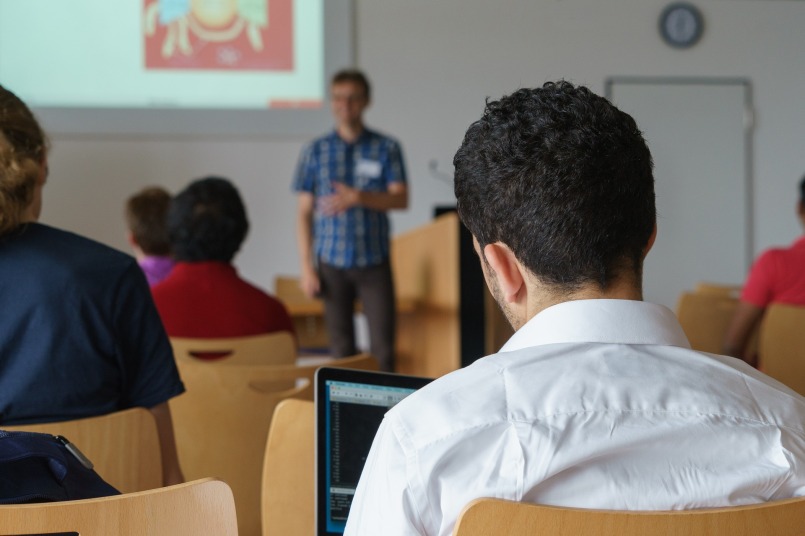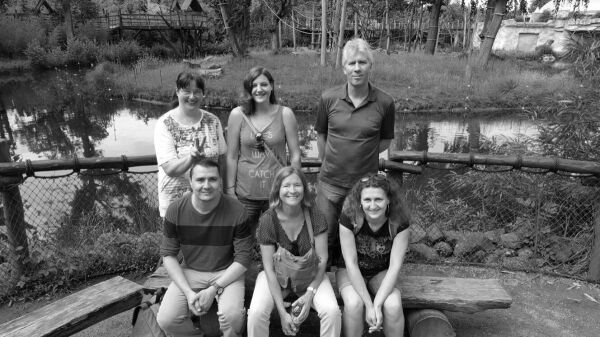M.Sc. Automation and Safety
Study period
4 semesters (2 years)
Credits
120
Study begin
Winter and summer semester
Study place
Campus Duisburg
Language
50% German & 50% English
Description
The topics of process monitoring, fault diagnosis and fault-tolerant systems are becoming increasingly important in research and industrial applications. This is due to the constantly growing requirements for high system reliability and availability. In the context of Industry 4.0 in particular, there are innovative applications in control and regulation technology that go beyond traditional areas of application such as mechatronics. These include distributed systems and working methods that have emerged through the merging of traditional specialist areas.
The Master's degree course builds on the knowledge acquired in the Bachelor's degree course in Electrical, Electronic and Communications Engineering. Students deepen their knowledge of automation and control engineering methods and their implementation in computer-aided systems. A further focus is on the mathematical modeling and simulation of automated processes. Through interdisciplinary courses in the natural sciences, electrical engineering, mechanical engineering and computer science, students acquire the necessary knowledge to work on challenging problems and solve complex automation tasks.
The career prospects for graduates are diverse. Possible areas of employment include design, planning and project management in fields such as automation technology, process technology, production control, energy technology, building control technology, traffic control and automation in the automotive and aviation industries. The course is ideal for anyone who wants to specialize in future-oriented automation and control engineering technologies and gain a foothold in an innovative professional field.
Study at UDEInformation about the degree program
Study plan
Study plan
You can find the examination regulations for your study program here: Examination regulations according to study programs
Study plans as well as information about the modules in the study program can be found in the module handbook:
Module handbook: M.Sc. Automation and Safety (PO24)
Module handbook: M.Sc. Automation and Safety - Safe Systems (PO19)
Module handbook: M.Sc. Automation and Safety - Automation and Control Engineering (PO19)
Information material
Study plans as well as information about the modules in the study program can be found in the module handbook: M.Sc. Automation and Safety (PO24)
Admission
Admission requirements
- Completion of a bachelor's degree program in the ISE study program with an overall grade of 3.0 or better or
- equivalent degree from another home or foreign university with an average grade of 3.0 or better. The assessment of equivalence is made by the examination board.
If the admission requirements according to paragraph 2 are not fulfilled or if a change of the field of study within the study program "ISE" takes place during the transition from Bachelor to Master, the examination board can combine the admission to the Master program with the condition to prove certain knowledge until the registration of the Master thesis. The type and extent of these requirements are determined individually by the examination board on the basis of the course content completed as part of the previous degree. The extent of the requirements is up to 2 courses.
Further information regarding admission requirements can be found on the pages of the study program "ISE".
Admission
This study program has unrestricted admission (study places are not limited). Enrollment takes place during the enrollment period at the student register's office at the Duisburg campus. [Forms and further information]
For national applicants the following applies until further notice:
National applicants for the ISE Bachelor's or ISE Master's program are requested to submit their Abitur/Bachelor's or comparable degree certificates to the ISE Examination Committee in order to obtain confirmation of their special enrollment requirements and foreign language skills. This certificate must be presented at the time of enrollment.
ISE Examination Board
University of Duisburg-Essen
Faculty of Engineering
SG 182
Geibelstr. 41, 47057 Duisburg
pa-ise@uni-due.de
Prospective students from non-EU countries should apply via UDE's application portal.
Language Skills
Upon enrollment, applicants must provide proof of English and German language skills corresponding to the completed level B2 of the Common European Framework of Reference for Languages (CEFR).
Study abroad
Study-related stays abroad
For students who have acquired their university entrance qualification at a German institution, a stay abroad of three to six months is obligatory.
For students who have already completed this stay abroad as part of their ISE Bachelor's program, a further stay abroad is optional (§ 11 PO).
A study abroad can be easily integrated into your degree program. With a wide range of international exchange programs, you can spend one or more semesters abroad without extending your studies.
Your planned courses and academic achievements are coordinated with your faculty in advance, ensuring that the credits you earn abroad can be easily recognized. Many students take this opportunity to gain international experience and new perspectives for their studies and future career.
Your exchange opportunities:
- Europe: through ERASMUS+ and Aurora partner universities, e.g., in Italy, Spain, Austria, France, Finland, Turkey, and many other countries.
- Asia: Our exchange program with two partner universities in Southeast Asia is particularly attractive, including Universiti Kebangsaan Malaysia (UKM) and Universitas Indonesia (UI).
- Worldwide: our faculty maintains numerous cooperation programs worldwide – from Brazil and Mexico to South Korea, Taiwan, Japan, and many other countries.
Further information:
https://www.uni-due.de/iw/en/international/fiw
General Information
Living & Studying at the University of Duisburg-Essen

Semester
The academic year is divided into semesters.
- Winter semester: from October to March
- Summer semester: from April to September

Lecture period
The winter lecture period usually starts in mid-October and ends in mid-February. In summer, the lecture period usually starts in mid-April and ends in July. During the winter semester there is a break of about two weeks during the Christmas holidays.

Examination phase
The examination phase begins about one week after the end of the lecture period and lasts about seven weeks.
Semester fee
All students have to pay a semester fee (social contribution) of about 320,- Euro per semester. You can find the current amount here. The social contribution includes, among other things, a semester ticket for public transportation in North Rhine-Westphalia and discounts on meals in the university's canteen and cafeteria.
Living expenses
We recommend to consider approximately 800 to 1000 Euro of personal expenses per month.
Accommodation
Accommodation is possible in dormitories of the Studierendenwerk and in premises of the free housing market. The rent in a room in a student dormitory is about 300,- Euro per month. You can find more information about housing options here.
Introduction of the institutes
Contact
You have questions? We have answers!

Support Center for (International) Engineering Students Student advisory service
SG 119
Geibelstr. 41
47057 Duisburg
Phone: +49 (0)203 379 3776
E-mail: scies@uni-due.de

Student council ISE - International Studies in Engineering
We are your point of contact! If you have questions about your studies or general concerns about us or our lecturers, you can contact us. We will solve your problems and answer your questions directly if possible or forward you to the right people. Just write us an email (info@isefs.uni-due.de)
For prospective students and enrolled students General student counseling
ABZ offers counseling to prospective students, enrolled students and graduates on all questions concerning the choice of study program, studies and the transition into working career.
Support in the Faculty
Prof. Dr.-Ing. Steven X. Ding
Room BB 511
Tel.: 0203/379-3386
Office hourse: by appointment
Prof. Dr.-Ing. Dirk Söffker
Room MB 341
Tel.: 0203/379-3429
Office hourse: by appointment









